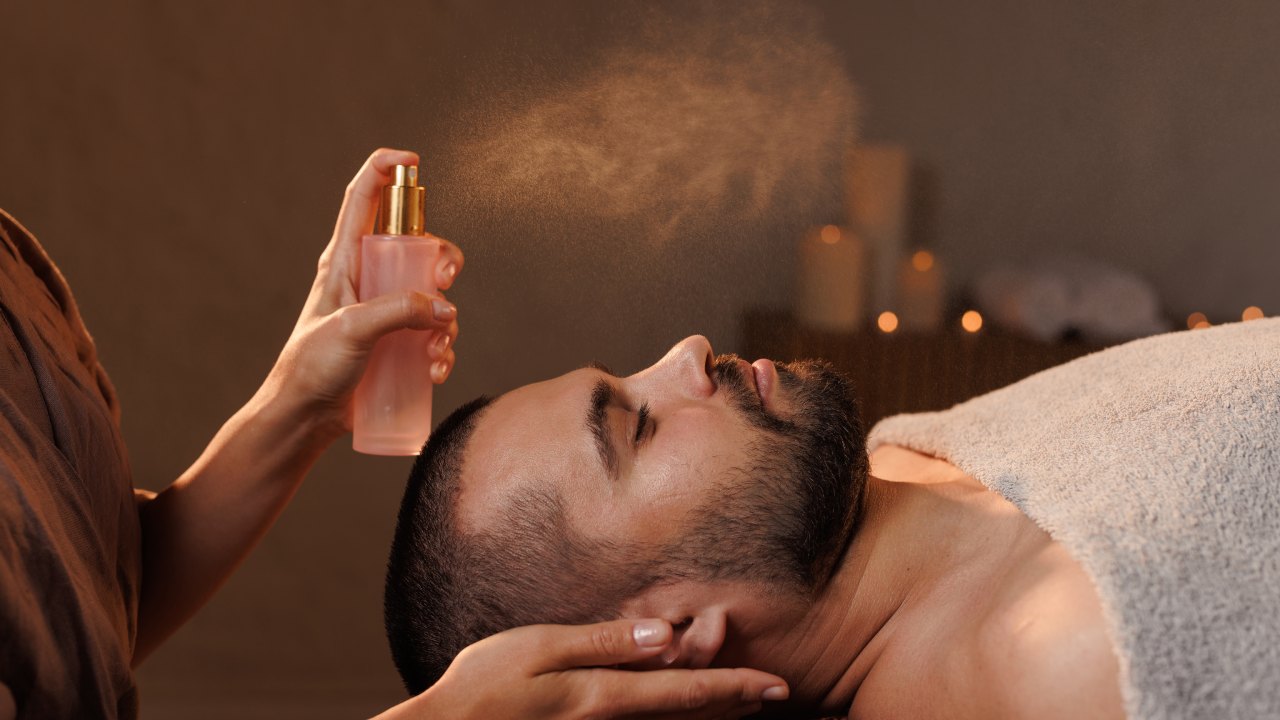Aromatherapy: An Introduction
What is Aromatherapy?
Aromatherapy refers to the holistic healing practice that uses natural plant extracts, known as essential oils, to promote physical and mental well-being. These essential oils are derived from flowers, leaves, bark, and roots through processes like steam distillation or cold pressing. When inhaled or applied topically, the aromatic compounds in these oils interact with the brain and body to bring about various health benefits. Our focus here is to explore how scents can improve mental well-being.
History of Aromatherapy
The practice of using aromatic plants for healing dates back thousands of years. Ancient civilizations, including the Egyptians, Greeks, and Chinese, employed aromatic plants in religious rituals, medical treatments, and daily life. The term “aromatherapy” itself was coined in the early 20th century by a French chemist named René-Maurice Gattefossé, who discovered the healing power of lavender oil in treating burns and skin infections. Throughout history, the use of aromatherapy has evolved and expanded, becoming a widely accepted complementary therapy for promoting mental wellness.
| Timeline | Key Developments in Aromatherapy |
|---|---|
| Ancient Times | Use of aromatic plants in religious rituals and medicine |
| 1907 | Term “aromatherapy” coined by René-Maurice Gattefossé |
| Modern Era | Integration into holistic and complementary medicine |
Benefits of Aromatherapy for Mental Wellness
Aromatherapy offers various benefits for mental wellness by utilizing the power of scents to influence mood and emotions. Here are some of the key advantages:
- Stress Relief: Certain essential oils, such as lavender and chamomile, promote relaxation and reduce stress levels. Learn how to incorporate these practices in our section on aromatherapy for stress relief.
- Improved Sleep: Essential oils like lavender and cedarwood can help improve sleep quality by creating a calming environment. Explore bedtime rituals in our section on aromatherapy for better sleep.
- Enhanced Mood: Scents such as citrus or peppermint can uplift your spirits and alleviate symptoms of depression and anxiety. For more on sensory-based therapies, visit music therapy: healing through sound.
- Mental Clarity: Oils like rosemary and eucalyptus can enhance concentration and mental clarity.
| Benefit | Best Essential Oils |
|---|---|
| Stress Relief | Lavender, Chamomile |
| Improved Sleep | Lavender, Cedarwood |
| Enhanced Mood | Citrus, Peppermint |
| Mental Clarity | Rosemary, Eucalyptus |
By understanding the principles and history of aromatherapy, we can better appreciate how this ancient practice continues to be relevant in modern mental health care. For other holistic options, consider reading about the benefits of mindfulness and meditation, or explore nutrition and mental health: foods that boost your mood.
Understanding the Power of Scents
Aromatherapy is a holistic healing treatment that uses natural plant extracts to promote health and well-being. To comprehend how scents can influence our mental state, let’s explore the connection between our senses and emotions.
How Scents Affect Mental Well-being
The sense of smell, while sometimes overlooked, plays a significant role in our mental health. Scents are processed in the olfactory bulb, which directly connects to regions of the brain that handle memory and emotion. As a result, certain aromas can trigger emotional responses and memories, affecting our mood and overall mental well-being.
Scents can offer various benefits, such as reducing stress, improving sleep, and enhancing mood. For those interested in a comprehensive approach to mental wellness, combining aromatherapy with other therapeutic practices like mindfulness and meditation and yoga for mental health can be particularly effective.
Different Types of Essential Oils and Their Effects
Understanding the different types of essential oils and their effects can help us tailor our aromatherapy practices to meet our specific needs. Here’s a look at some commonly used essential oils and their mental health benefits.
| Essential Oil | Effect on Mental Well-being |
|---|---|
| Lavender | Promotes relaxation and reduces anxiety |
| Peppermint | Enhances focus and alleviates mental fatigue |
| Eucalyptus | Reduces mental exhaustion and improves mood |
| Chamomile | Relieves stress and promotes a calm state |
| Ylang-Ylang | Eases stress and uplifts mood |
| Bergamot | Reduces anxiety and boosts mood |
By integrating these essential oils into our daily routines, we can foster a more balanced mental state. Methods of incorporating aromatherapy into daily life can include diffusion, topical applications, and even combining oils with other therapies like art therapy and music therapy.
To safely and effectively use essential oils, it’s important to consult with healthcare professionals. For those dealing with anxiety or depression, pairing aromatherapy with professional guidance from mental health clinics can offer comprehensive support. Combining aromatherapy with practices such as maintaining social connections and engaging in physical exercise can further amplify the benefits.
By enriching our understanding of the power of scents, we can unlock new avenues for enhancing our mental well-being and achieving serenity in our daily lives.
Incorporating Aromatherapy into Your Mental Health Routine
Understanding how to effectively and safely integrate aromatherapy into our mental health routine can significantly enhance our overall well-being. Let’s explore the key aspects of using essential oils and the various methods of application.
Using Essential Oils Safely
When we use essential oils, safety is paramount. Essential oils are highly concentrated and potent, hence it is crucial to handle them with care to avoid adverse effects.
Guidelines for Safe Use:
- Dilution: Always dilute essential oils with a carrier oil (e.g., coconut oil, almond oil) before applying them to the skin to prevent irritation. A typical dilution ratio is 1-2% essential oil to carrier oil.
- Patch Test: Conduct a patch test on a small area of skin before applying a new essential oil mixture broadly. This helps identify any allergic reactions.
- Storage: Store essential oils in a cool, dark place, away from direct sunlight to maintain their efficacy.
Methods of Aromatherapy Application
There are several effective ways to incorporate essential oils into our daily routine to promote mental wellness.
| Method | Description |
|---|---|
| Diffusion | Using a diffuser, essential oils are dispersed into the air. |
| Topical | Oils are applied to the skin after dilution with a carrier oil. |
| Inhalation | Directly inhaling the oils from the bottle or using steam. |
| Bathing | Adding essential oils to a bath for aromatic and topical benefits. |
Diffusion
Diffusing essential oils can create a calming atmosphere in any space. Add a few drops of your preferred essential oil to a diffuser filled with water and let the aroma enhance your environment.
Topical Application
Topical applications, such as massage, are effective for targeting specific areas. Ensure proper dilution and gently massage the diluted oil into your skin.
Inhalation
Inhaling essential oils can provide immediate relief from stress and anxiety. Simply inhale the aroma directly from the bottle or add a few drops to a bowl of hot water and inhale the steam.
Bathing
Adding a few drops of essential oil to your bath can create a spa-like, relaxing experience. This method combines both aromatic and skin benefits.
Creating a Relaxing Aromatherapy Environment
Creating an environment conducive to relaxation and mental peace can amplify the benefits of aromatherapy. Here are some tips:
- Choose Appropriate Scents: Select essential oils known for their calming properties, such as lavender, chamomile, or bergamot.
- Incorporate Other Relaxation Techniques: Combine aromatherapy with practices like music therapy, the benefits of mindfulness and meditation, or yoga for mental health.
- Design the Space: Create a serene environment with comfortable seating, soft lighting, and minimal distractions.
For more ways to enhance your mental health, consider exploring our articles on the therapeutic benefits of journaling, nutrition and mental health, and the impact of nature on mental health.
By understanding how to safely use essential oils, the different methods of application, and how to create a relaxing environment, we can effectively incorporate aromatherapy into our mental wellness routine and experience its numerous benefits.
Aromatherapy for Stress Relief
Aromatherapy can be an effective method for managing and alleviating stress. By leveraging the natural properties of essential oils, we can create a soothing environment that promotes relaxation and mental wellness.
Best Essential Oils for Stress Relief
Certain essential oils are particularly well-known for their stress-relieving properties. These oils can help calm the mind and reduce feelings of anxiety.
| Essential Oil | Primary Benefit |
|---|---|
| Lavender | Promotes relaxation and reduces anxiety |
| Chamomile | Calms the mind and alleviates stress |
| Bergamot | Uplifts mood and reduces tension |
| Ylang-Ylang | Improves mood and reduces blood pressure |
| Frankincense | Promotes inner peace and reduces negative emotions |
Aromatherapy Techniques to Reduce Stress
There are several methods to incorporate aromatic practices into our daily routine for stress relief. Each technique can be tailored to fit individual preferences and lifestyles.
- Diffusing: Using essential oil diffusers to disperse the scent throughout a room.
- Topical Application: Diluting essential oils with a carrier oil and applying to the skin.
- Inhalation: Directly inhaling the scent from a bottle or using aromatherapy inhalers.
- Baths: Adding a few drops of essential oil to a warm bath for a relaxing experience.
Combining Aromatherapy with Other Stress-Relief Practices
Maximizing the benefits of aromatherapy often involves combining it with other stress-relief practices. Integrating these holistic approaches can enhance overall well-being.
- Mindfulness and Meditation: Pairing essential oils with the benefits of mindfulness and meditation.
- Physical Exercise: Incorporating aromatic practices with the role of physical exercise in managing anxiety and depression for enhanced relaxation.
- Yoga: Using essential oils during yoga for mental health: poses and practices to deepen the experience.
- Art Therapy: Utilizing aromatherapy in conjunction with the healing power of art therapy for stress reduction.
- Journaling: Enhancing the therapeutic benefits of journaling by diffusing calming scents while writing.
By exploring these essential oils and techniques, we can find effective ways to incorporate aromatherapy into our daily lives, helping to manage stress and improve our overall mental well-being.
Aromatherapy for Better Sleep
Creating a nighttime routine with aromatherapy can significantly enhance your sleep hygiene and help improve the quality of your rest. Here’s how to integrate essential oils for better sleep.
Essential Oils to Promote Sleep
Certain essential oils are known for their sleep-promoting properties. These oils can help you unwind, relax, and prepare your mind and body for a restful night. Popular essential oils for sleep include lavender, chamomile, and sandalwood.
| Essential Oil | Key Benefit |
|---|---|
| Lavender | Calming and relaxing |
| Chamomile | Reduces anxiety |
| Sandalwood | Promotes tranquility |
Detailed understanding of these oils and their effects can enhance their usage. Check out our article on aromatherapy: can scents improve mental well-being? for more insights.
Bedtime Aromatherapy Rituals
Incorporating aromatherapy into your bedtime routine can be simple yet effective. Consider these methods:
- Diffusers: Add a few drops of your chosen essential oil to an aromatherapy diffuser.
- Pillow Sprays: Lightly spray a diluted essential oil solution on your pillow.
- Bath Soaks: Add essential oils to your evening bath.
Consistency and creating a calming pre-sleep environment are crucial. Additional relaxation techniques can be found in our article on the benefits of mindfulness and meditation.
Creating a Sleep-Inducing Aromatherapy Atmosphere
Transforming your bedroom into a sanctuary of tranquility can significantly aid sleep. Using essential oils effectively can create a soothing atmosphere conducive to rest.
Consider these tips:
- Room Spray: Use a mixture of essential oils and water to make a room spray that you can use before bedtime.
- Candles: Scented candles with essential oils can provide both light and fragrance.
- Aromatherapy Lamps: Some lamps diffuse essential oils while providing ambient lighting.
For more ideas on creating a holistic mental wellness environment, read our article on the impact of nature on mental health.
By carefully selecting and using essential oils, you can enhance your sleep quality through the subtle yet powerful effects of aromatherapy. Experiment with different oils and methods to discover what best suits your sleep needs.
Seeking Professional Guidance
While aromatherapy provides many benefits for mental health, it’s vital to seek guidance from mental health professionals when incorporating it into a comprehensive wellness plan.
Consulting a Mental Health Professional
Understanding that aromatherapy is not a standalone treatment is essential. Therefore, it’s beneficial to consult a licensed mental health professional to better integrate aromatherapy into your mental health care regime. Professionals can provide personalized advice based on your history and needs, ensuring safety and effectiveness.
Mental health professionals include:
| Professional Type | Role |
|---|---|
| Psychiatrists | Diagnose and treat mental illnesses, prescribe medication |
| Psychologists | Provide therapy and counseling, conduct psychological testing |
| Therapists/Counselors | Offer therapy sessions to address emotional challenges and mental health disorders |
A mental health professional can also evaluate how aromatherapy might complement traditional treatments like medication, psychotherapy, or other holistic practices. Check out our articles on the benefits of mindfulness and meditation and nutrition and mental health: foods that boost your mood for more ways to enhance your mental wellness.
Incorporating Aromatherapy into Therapy Sessions
Once you’ve consulted a mental health professional, the next step is to safely incorporate aromatherapy into your therapy sessions. Licensed therapists can suggest the best essential oils tailored to your specific mental health needs, helping you understand how different scents can elicit desired emotional responses.
Some ways therapists might incorporate aromatherapy include:
- Diffusion: Using an essential oil diffuser to disperse the aroma in the therapy room.
- Topical Application: Applying diluted essential oils to the skin, particularly during practices like massage therapy.
- Inhalation: Encouraging clients to inhale essential oils directly or through a steam bath.
They might also guide you on combining aromatherapy with other therapeutic practices, such as the healing power of art therapy, the therapeutic benefits of journaling, or music therapy: healing through sound.
To further enhance mental wellness, therapists can blend aromatherapy with various stress-relief and relaxation techniques, such as the role of physical exercise in managing anxiety and depression or the importance of social connections for mental health.
By seeking professional guidance, we can ensure that our journey with aromatherapy is both safe and effective, ultimately enhancing our overall mental wellness.





